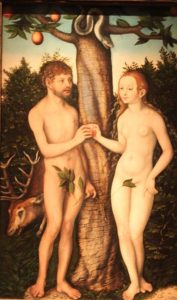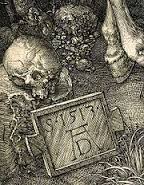by Rev. Jesse Burns
 In the second article of the Augsburg Confession, Lutherans confess, “It is also taught among us that since the fall of Adam all men who are born according to the course of nature are conceived and born in sin. That is, all men are full of evil lust and inclinations from their mothers’ wombs and are unable by nature to have true fear of God and true faith in God. Moreover, this inborn sickness and hereditary sin is truly sin and condemns to the eternal wrath of God all those who are not born again through Baptism and the Holy Spirit.”[1]
In the second article of the Augsburg Confession, Lutherans confess, “It is also taught among us that since the fall of Adam all men who are born according to the course of nature are conceived and born in sin. That is, all men are full of evil lust and inclinations from their mothers’ wombs and are unable by nature to have true fear of God and true faith in God. Moreover, this inborn sickness and hereditary sin is truly sin and condemns to the eternal wrath of God all those who are not born again through Baptism and the Holy Spirit.”[1]
This “hereditary sin” is also sometimes called “original sin.” All descendants of Adam and Eve are born with this sin. Thus, when we Lutherans gather for the Divine Service, we say things like, “I, a poor, miserable sinner…”[2] or “We confess that we are by nature sinful and unclean.”[3] Though this sin is passed on to us from our first parents, we, ourselves, are no less guilty of it. It is our own sin, and we would be rightly condemned because of it if God had not redeemed us.
Read Genesis 3:1-6.
1. In chapter 2 we learned how man was created in the image of God. Man was perfectly righteous before God, which meant that his will was in line with God’s will. Whatever God wanted, man also wanted. However, all of that changed in the fall. Man’s will turned from God and now, by nature, does none of the things God wants or commands.
Luther writes, “Therefore this manifold corruption of our nature should not be minimized; it should rather be emphasized…This should be emphasized, I say, for the reason that unless the severity of the disease is correctly recognized, the cure is also not known or desired. The more you minimize sin, the more will grace decline in value.”[4] According to these words, why is it detrimental to downplay our sin? Why is it paramount that the Christian Church not shrink from preaching sin and repentance? What is lost when sin is no longer recognized for what it truly is? Luther mentioned “the cure” for the disease. What (or rather Who) is that cure?
 2. See Genesis 2:16-17. What command and warning had God given Adam? Luther explained that the tree of the knowledge of good and evil was Adam’s church, altar, and pulpit where he would proclaim the goodness of God and respond to all that God had given by obedience to that one command. In other words, the first man was to live by faith – by trust in God who had given him all that he needed.
2. See Genesis 2:16-17. What command and warning had God given Adam? Luther explained that the tree of the knowledge of good and evil was Adam’s church, altar, and pulpit where he would proclaim the goodness of God and respond to all that God had given by obedience to that one command. In other words, the first man was to live by faith – by trust in God who had given him all that he needed.
3. Luther writes about Satan’s temptation of man in Genesis 3:1-5, “Therefore Satan here attacks Adam and Eve in this way to deprive them of the Word and to make them believe his lie after they have lost the Word and their trust in God.”[5] Later he writes, “For the chief temptation was to listen to another word and to depart from the one which God had previously spoken: that they would die if they ate from it.”[6] How is Satan’s temptation an attack on the Word of God? Where do we see this technique of Satan underway today? What can we Christians, who live by God’s Word, learn from this temptation?
4. Satan led Eve to question God’s withholding of the fruit from the tree of the knowledge of good and evil and also to doubt His Word. Luther writes, “But reason did not understand the purpose of these words, why God wanted it to be so. Therefore, Eve perishes while she investigates too inquisitively and refuses to be satisfied with what she had heard the Lord command. Thus this temptation is a true pattern of all temptations with which Satan assails the Word and faith.”[7] What are some things that God has said in His Word that our reason cannot fully comprehend? How might we be tempted like Eve was here? How ought a Christian approach those things our reason does not understand?
 Again Luther, “To this sin our entire nature has succumbed. How could it overcome this sin, since its magnitude is inexhaustible? To overcome this sin, we need Him who brings with Him inexhaustible righteousness, that is, the Son of God.”[8] Left on our own, we could not overcome sin. But God has not left us on our own. He has not left us in our sin. Rather, He has provided rescue and redemption in our Savior Jesus. Christ’s perfect righteousness covers all of our unrighteousness. His sinless body, offered up in our place upon the cross of Calvary, has paid the debt of all of our sin. By His life, death, and resurrection, we sinners are reconciled to the Father, and in Baptism His righteousness has become ours.
Again Luther, “To this sin our entire nature has succumbed. How could it overcome this sin, since its magnitude is inexhaustible? To overcome this sin, we need Him who brings with Him inexhaustible righteousness, that is, the Son of God.”[8] Left on our own, we could not overcome sin. But God has not left us on our own. He has not left us in our sin. Rather, He has provided rescue and redemption in our Savior Jesus. Christ’s perfect righteousness covers all of our unrighteousness. His sinless body, offered up in our place upon the cross of Calvary, has paid the debt of all of our sin. By His life, death, and resurrection, we sinners are reconciled to the Father, and in Baptism His righteousness has become ours.
This is why we Lutherans can boldly say things like “I, a poor, miserable sinner…” or “We confess that we are by nature sinful and unclean.” It’s really all about Jesus. He alone is our righteousness and salvation!
The Rev. Jesse A. Burns is pastor of Redeemer Lutheran Church, Ventura, Iowa.
[1] The Book of Concord the confessions of the Evangelical Lutheran Church. 1959 (T. G. Tappert, Ed.). Philadelphia: Mühlenberg Press. page 29
[2] Divine Service Setting Three. The Lutheran Service Book (St. Louis, MO: Concordia Publishing House, 2006). page 184
[3] Ibid., page 151
[4] Luther, M. (1999). Vol. 1: Luther’s Works, vol. 1: Lectures on Genesis: Chapters 1-5 (J. J. Pelikan, H. C. Oswald & H. T. Lehmann, Ed.). Saint Louis: Concordia Publishing House., page 142
[5] Ibid., 147
[6] Ibid., 147
[7] Ibid., 158
[8] Ibid., 162
